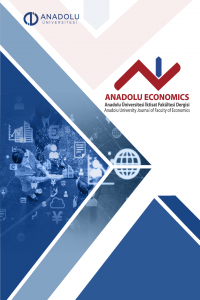Impact of Climate Change Shock on Rice Productivity of Smallholder Farmers in Nigeria’s North Central Region
Öz
The consequence of climate change shock on arable crop productivity especially rice, the largest consumed food in the world is threatening the global food security and a light out of this dark is very pertinent for continuous human existence. In lieu of the foregoing, this research attempt to determine the impact and quantified the contribution of climate change shock vis-à-vis climate change shock versus endowment effect on rice productivity using crucial econometric tools viz. Stalling’s weather index, Chow F-statistics, Average treatment effect (ATE) and Oaxaca-Blinder decomposition model. A total of 360 farmers were drawn from the sampling frame through a multi-stage sampling technique and data elicitations were done through the use of structured questionnaire coupled with interview schedule. A cost-route approach was used to collect the field survey data during the 2020 cropping season. Succinctly, from the empirical evidences it was established that most (60.83%) of the farmers have their average rice productivity been affected by climate change shock. Furthermore, climate change shock had both short and long runs effect on the average rice productivity, thus making the production structural change of the vulnerable farmers poor in comparison to the non-vulnerable farmers. Besides, structural effect termed climate change shock accounts for approximately 89.37% of the yield gap/differential between the two groups while 10.63% owes to their endowment related factors. Therefore, the study enjoins affected farmers to adopt smart agricultural practices viz. emulation of peers not affected by climate change shock, thus enhancing the sustainability of the enterprise and rice food security in the studied area.
Anahtar Kelimeler
Kaynakça
- Adedeji, I.A., Tiku, N.E., Waziri-Ugwu, P.R. and Sanusi, S.O.(2017).The effect of climate change on rice production in Adamawa State, Nigeria. Agroeconomia Croatica, 7(1):1-13
- Amaefula, C., Okezie, C.A. and Mejeha, R.(2012).Risk attitude and insurance: A causal analysis. American Journal of Economics, 2(3): 26-32
Impact of Climate Change Shock on Rice Productivity of Smallholder Farmers in Nigeria’s North Central Region
Öz
The consequence of climate change shock on arable crop productivity especially rice, the largest consumed food in the world is threatening the global food security and a light out of this dark is very pertinent for continuous human existence. In lieu of the foregoing, this research attempt to determine the impact and quantified the contribution of climate change shock vis-à-vis climate change shock versus endowment effect on rice productivity using crucial econometric tools viz. Stalling’s weather index, Chow F-statistics, Average treatment effect (ATE) and Oaxaca-Blinder decomposition model. A total of 360 farmers were drawn from the sampling frame through a multi-stage sampling technique and data elicitations were done through the use of structured questionnaire coupled with interview schedule. A cost-route approach was used to collect the field survey data during the 2020 cropping season. Succinctly, from the empirical evidences it was established that most (60.83%) of the farmers have their average rice productivity been affected by climate change shock. Furthermore, climate change shock had both short and long runs effect on the average rice productivity, thus making the production structural change of the vulnerable farmers poor in comparison to the non-vulnerable farmers. Besides, structural effect termed climate change shock accounts for approximately 89.37% of the yield gap/differential between the two groups while 10.63% owes to their endowment related factors. Therefore, the study enjoins affected farmers to adopt smart agricultural practices viz. emulation of peers not affected by climate change shock, thus enhancing the sustainability of the enterprise and rice food security in the studied area.
Anahtar Kelimeler
Kaynakça
- Adedeji, I.A., Tiku, N.E., Waziri-Ugwu, P.R. and Sanusi, S.O.(2017).The effect of climate change on rice production in Adamawa State, Nigeria. Agroeconomia Croatica, 7(1):1-13
- Amaefula, C., Okezie, C.A. and Mejeha, R.(2012).Risk attitude and insurance: A causal analysis. American Journal of Economics, 2(3): 26-32
Ayrıntılar
| Birincil Dil | İngilizce |
|---|---|
| Konular | Ekonomi |
| Bölüm | Araştırma Makaleleri |
| Yazarlar | |
| Yayımlanma Tarihi | 17 Kasım 2021 |
| Gönderilme Tarihi | 28 Nisan 2021 |
| Yayımlandığı Sayı | Yıl 2021 Cilt: 3 Sayı: 2 |


